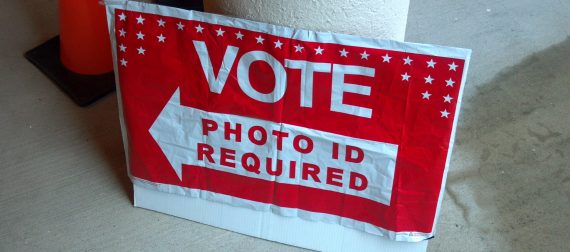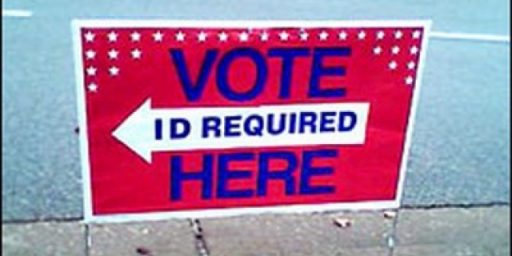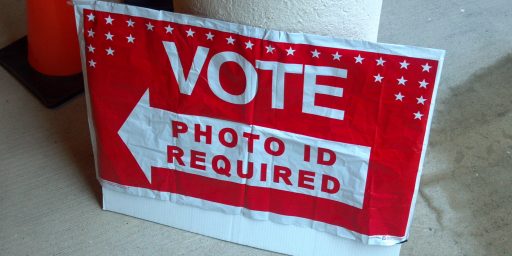Federal Judge Strikes Down Texas Voter ID Law
A victory for opponents of Voter ID in Texas, but it's not likely to stand up on appeal.
In addition to the Supreme Court’s decision to grant a stay against the Wisconsin Voter ID law pending appeal, opponents of Voter ID laws scored another victory last week when a Federal Judge in Texas struck down that state’s Voter ID law in a wide ranging opining that alleges the existence of evidence of a discriminatory intent in passing the law based largely on its disproportionate impact. As with the law in Wisconsin, though, it is probable that this will only be a temporary victory and that opponents will face a difficult road ahead at the Court of Appeals and, potentially, the Supreme Court.
AUSTIN, Texas — A federal judge on Thursday likened Texas’ tough voter ID rules to a poll tax meant to suppress minority voters and blocked Texas from enforcing it just weeks ahead of next month’s election, knocking down a law that the U.S. Justice Department condemned in court as deliberately discriminatory.
The ruling by U.S. District Judge Nelva Gonzales Ramos of Corpus Christi is a defeat for Republican-backed photo ID measures that have swept the U.S. in recent years and have mostly been upheld in court. And it wasn’t the only one. The U.S. Supreme Court also blocked Wisconsin from implementing a law requiring voters to present photo IDs.
Gonzales Ramos, an appointee of President Barack Obama, never signaled during a two-week trial in September that she intended to rule on the Texas law — rebuked as the toughest of its kind in the U.S. — before Election Day. But the timing could spare an estimated 13.6 million registered Texas voters from needing one of seven kinds of photos identification to cast a ballot.
The Justice Department says more than 600,000 of those voters, mostly blacks and Hispanics, currently lack any eligible ID to vote.
Gonzales Ramos’ ruling says the law “creates an unconstitutional burden on the right to vote, has an impermissible discriminatory effect against Hispanics and African-Americans, and was imposed with an unconstitutional discriminatory purpose.” It added that the measure: “constitutes an unconstitutional poll tax.”Republican Texas Attorney General Greg Abbott’s office said it would appeal.
“The State of Texas will immediately appeal and will urge the Fifth Circuit to resolve this matter quickly to avoid voter confusion in the upcoming election,” said Lauren Bean, a spokeswoman for Abbott’s office.
(…)
Abbott is favored to win the race to replace Perry as governor. His office said minorities and whites alike supported the law in public opinion polls. It also pointed to other states, such as Georgia and Indiana, where the similar measures have been upheld.
But opponents slammed Texas’ law as far more discriminatory. College students IDs aren’t accepted by poll workers, but concealed handgun licenses are. Free voting IDs offered by the state require a birth certificate that costs little as $3, but the Justice Department argued that traveling to get those documents imposes an outsize burden on poor minorities.
As a result, opponents say, Texas has issued fewer than 300 free voter IDs since the law took effect. Georgia, meanwhile, has issued 2,200 voter IDs under a similar program with more robust outreach.
The ruling in this case differs in several ways from the April ruling by Judge Lynn Adelman striking down Wisconsin’s Voter ID law. In that decision, Judge Adelman found that the law imposed a disproportionate burden on minorities and the poor, a conclusion that was based mostly on academic studies and suppositions, while also finding that there was little evidence of the kind of in person voter fraud that Voter ID’s laws would help to curtail. Given this, Adelman essentially found that the burden imposed by the law outweighed any supposed benefits and was therefore unconstitutional. In the Texas case, Judge Gonzales goes a step further and finds that there was a definite discriminatory intent behind the law. On the surface, this would appear to give her opinion a much stronger legal basis on appeal than Adelman’s, but on some level that appears that it may be an illusion. By and large, Gonzaeles’s conclusions about intent appear to be based largely on suppositions and inferences drawn from the supposed disproportionate impact of the law on minorities and the poor. There doesn’t appear to be anything in the opinion showing anything in the legislative record to support the idea that the legislators who voted for the law intended for the law to have this impact, or that the stated legislative intent of ensuring the integrity of the voting process. Yes, it’s possible to infer intent from impact in these types of cases, and perhaps the evidence developed at trial in this case will prove to be strong enough on appeal to withstand the tests that it will subjected to. However, it’s worth keeping in mind that the finding of “discriminatory intent” that is the headline grabber in this case isn’t necessarily as strong as it sounds, especially when judged against the relevant precedent regarding both Section 2 of the Voting Rights Act and the issue of Voter ID laws in particular.
The Texas Attorney General’s Office has already announced that they intend to appeal Judge Gonzalez’s decision to the Fifth Circuit Court of Appeals. As far as the merits of the case go, the makeup of the Fifth Circuit suggests that the state will have a much better chance of success on appeal than they did at the District Court level, which means that this holding may not be long for this world once the matter is fully briefed and argued. More immediately, though, it’s likely that the state will ask the Fifth Circuit to put a stay on Judge Gonzalez’s order and allow the law to remain in effect for the upcoming elections. This, quite obviously, raises many of the same issues that were present in the Wisconsin case regarding whether changes to election laws should be implemented by the courts in the immediate months and weeks before elections. No doubt when the Fifth Circuit considers this particular part of Texas’s application, they will be well aware of what happened in the Wisconsin case, so it’s unclear whether they might let the law remain in effect notwithstanding the decision at this late date. Given the factual similarities in the timing between the two cases, it doesn’t take much to assume that the Supreme Court would treat the question of a stay of the Texas law similar to the way they did in Wisconsin and issue the stay. As with the Wisconsin law, though, the ultimate fate of this law should it reach the level of Supreme Court appeal seems clear. Unless there is a clear evidentiary record of discriminatory intent, there simply isn’t a credible legal argument against Voter ID laws. You may think they are bad policy, but bad policy isn’t necessarily unconstitutional, and it doesn’t necessarily violate Federal Law. As long as we have a system where election laws are by and large controlled by state legislatures, though, these kinds of laws are going to be adopted, and they are going to pass Constitutional muster.
So, opponents of Voter ID have scored a victory down in Texas, but it’s likely to be short-lived. In fact, I would expect this law to be in full force and effect by the time the 2016 Presidential elections roll around.
Here’s the opinion:




Please, Mr. Mataconis –
Why, other than SPECIFICALLY targeting one voting block of people, and FAVORING another voting block of people, would make a College Student ID not a legal document for voting while making a Firearms License a legal document for voting?
I believe, given demographics and voting patterns, and history, it would be pretty easy to prove that there is intent behind the law to make it more difficult for a very specific group of people to get the neccessary ID to vote, hence making it discriminatory.
Predicting the Fifth Corcuit will vote to gut voting rights for minorities is like predicting Orville Faubus’ views on white supremacy. There really is only one result.
The DOJ, ACLU and NAACP should just keep fighting the good fight for posterity. After all they’ve been here before. They are simply fighting the spiritual descendants of Orville Faubus again in the hope that a future Supreme Court will once again commit to minority voting rights.
@Stonetools: My friend, I think you would find it interesting to look into the racial policies and apparent beliefs of Mr Orval Faubus. It’s kind of a morality tale: A combat vet from WW2 who joins what (for the time & place) was a ‘liberal’ and ‘reforming’ group of Democrats, ends up in the governors mansion and finds that his ‘liberal’ agenda requires keeping some support from the conservative wing of the state Democrats (the ‘delta boys’). Ends up tarred forever as an arch segregationist.
@Stonetools: The bright side to all this is that since the current crop of voter suppression laws is focusing on dismantling Civil Rights era legislation, and Congress won’t reinstate it, the only way forward for liberal jurispudence on this is for a liberal SCOTUS majority (and I think that if Hillary wins in 2016, we will have one) to declare the voting is a fundamental right of citizenship, that cannot be denied under the 14th amendment. A decision like this is not a panacea, but it will be a major step forward.
The other ray of hope is that if we keep on having a conservative majority, the GOP in statehouses will keep on doing what it is doing now- trying to affect voting on the margins, and not do what it is clealry itching to do – openly restrict franchise to the ‘makers’.